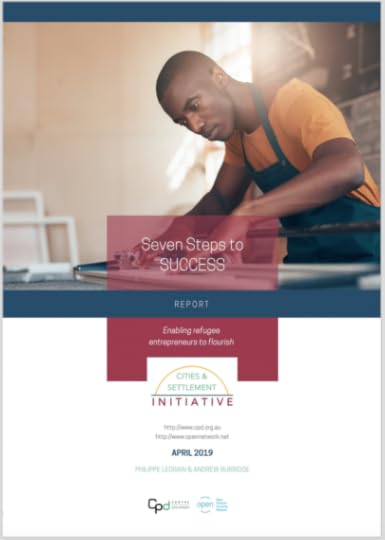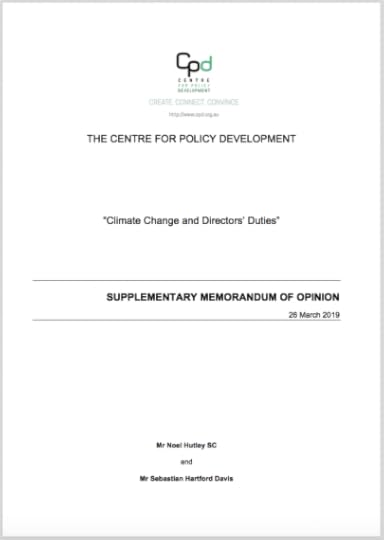Centre for Policy Development's Blog, page 23
July 1, 2019
Protected: Eighth meeting | ASIA DIALOGUE ON FORCED MIGRATION | June 2019
This content is password protected. To view it please enter your password below:
Password:
The post Protected: Eighth meeting | ASIA DIALOGUE ON FORCED MIGRATION | June 2019 appeared first on Centre for Policy Development.
Travers McLeod’s response to Rebecca Huntley’s Quarterly Essay, Australia Fair: Listening to the Nation
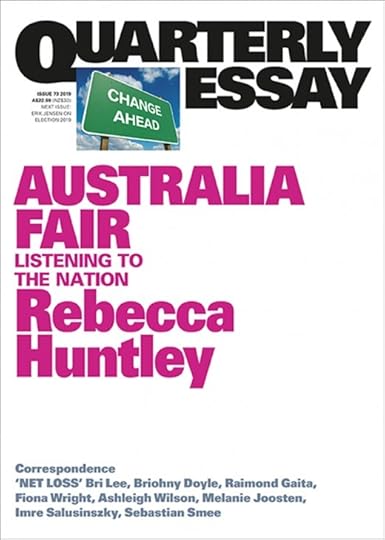
TRAVERS MCLEOD
At the heart of Rebecca Huntley’s Australia Fair is the idea that we are a nation of democrats. Our affinity with democracy is much more than the process of voting to elect a government. It is our collective desire for a confident democracy, with government as an active and effective partner, and a fairer society where all Australians can live flourishing lives.
This is a powerful idea in an essay that I felt was spot-on in its claim that “there is an opportunity to renew social democracy, Australian-style.” The Centre for Policy Development’s research, which Huntley cites, discovered an Australian appetite for democratic and policy renewal, along with broad agreement on the direction of travel. We found that Australians believe democracy is a force for fairness and equality and would throw their support behind changes that get government and the economy working better for the community.
The federal election result does not disprove Huntley’s core claim. Elections are about placing trust in a person and a party to respond to the biggest problems and the greatest opportunities of our time. A clear set of ideas and policies can help to build trust. Ideas can also sow distrust and division. The election confirmed that citizens remain profoundly divided on the best path forward for the nation. But I am willing to believe, as Centre for Policy Development research shows, that all Australians share a desire to improve the lives of others and tackle our biggest problems together.
Many conservatives have forgotten the point Robert Menzies made in October 1942, when he said that Australians “disagree among ourselves on almost every conceivable subject, but we are all democrats.” Menzies said our “most grievous error” has been to think “too much of democracy in mechanical terms.” He also said, somewhat ominously, that “if, as a voter, I am concerned only with my own advantage and am indifferent to the cost to others, I am simply corrupt. I am selling my vote for an individual mess of pottage.”
Truth be told, most Australians have equated national politics in Canberra with a thick stew. The pressure-cooker environment of the past decade has produced an enormous gap between what Australians want from their democracy and what it has delivered. More than two-thirds of Australians told CPD that they do not believe their elected representatives serve their interests. Three-quarters believe politics is fixated on short-term gains instead of long-term challenges. They are not sure government will help to look after them, their families and their communities over the long term.
In April, Gabrielle Chan reported for The Guardian on the fury in Farrer, an electorate in country New South Wales stretching along the Murray River from Wentworth to Albury. The source of the fury was water, or the lack of it, in a land beset by drought. Months earlier, the South Australian Murray-Darling Royal Commission had described the “do-nothing” conduct of the senior management and the board of the Murray-Darling Basin Authority in relation to climate change as “negligent” and “unlawful.” Farrer didn’t fall to an independent, as some thought it might, but there was a swing of almost 10 per cent against the sitting member.
I spent six months in Albury in 2017. What struck me was how different the conversation about climate change was on Dean Street in Albury, compared to the rhetoric a few hundred kilometres up the road in Canberra. What the locals in Albury couldn’t stand most of all was being treated like mugs – taken for granted or ignored in the national conversation. Tellingly, it was a road trip from Sydney to Adelaide via Deniliquin, a town near the Murray River, that the Reserve Bank’s deputy governor, Guy Debelle, used to frame his landmark speech about climate change and the economy in March this year. Describing climate change as a “trend” change likely to have “first-order” economic effects, Dr Debelle said:
“The transition path poses challenges, but it also presents opportunities. Particular industries and particular communities that are especially exposed to the costs of changes in the climate will face lower costs if there is an early and orderly transition. Others will bear greater costs from the transition to a lower carbon economy. While others still, such as the renewables sector, may benefit from that transition. But unlike the example of trade, it may not be possible for the winners to compensate the losers in a way that leaves no-one worse off.”
The election result has not washed away these problems. They will become more acute. The murkiness of the Murray-Darling Basin Authority and water buybacks is one thing. The lack of a coherent national strategy on climate change is another. Bizarrely, compelling evidence in support of constructive policy change does not lead to political action. But inaction like this is not limited to climate change.
Instead of climate change, consider “jobs” as an example. In the 2018 December quarter, the unemployment rate in Albury City was 9.26 per cent, more than double the overall rate in New South Wales. That same month, the report I Want to Work: Employment Services 2020 was released by the then federal minister for jobs, Kelly O’Dwyer. This expert review of jobactive, Australia’s $6.5 billion employment services system, consulted more than 1400 jobseekers, employers, employment services providers and community groups. Its blunt assessment was that Australia “can do better. Much better.” Consultant-to-client ratios were 1:148. Only 4 per cent of Australian employers were using jobactivein 2018 (down from 18 per cent in 2007). The system was failing a large majority of jobseekers who had been on the books for twelve months or more.
Given that outsourced delivery contracts for jobactive were due to expire in 2020, here was a great opportunity to think big, act on expert advice and embrace local solutions that were fit for purpose. To build an employment services program in Albury, for example, that was designed to meet the needs of that community. The response? Apart from two trials, the can was kicked further down the road. Shortly before the federal election was announced, Minister O’Dwyer extended existing jobactive contracts for a further two years, to the middle of 2022. One of 2019’s biggest policy reform opportunities sank with barely a ripple. Providers damned in a national review won contracts for another two years. Our most disadvantaged jobseekers lost out – again. A thick stew indeed.
Huntley’s essay tells us that Australians do not want to do away with democracy. We want to save it. The big question is: how?
Just as Australian democrats value substance over style, so it goes that ideas developed with local communities will matter as much as national reforms to systems and processes. Good democracies are stable. But they are not static. Nostalgia, whether it be for the reform era of the 1980s and ’90s (vale Bob Hawke) or the sanctity of our Anglo-American alliances, will not help Australia to grow and decarbonise our economy, create secure jobs, find our way in Asia, build an education nation, achieve equal rights for women and give substance to the Uluru Statement from the Heart. Blind faith in markets, microeconomics and outsourced services will not elevate the public interest above shareholder interest. Put simply, the “good society” in the twenty-first century does not resemble the “good society” of last century. It is, Huntley writes powerfully, “there for the making.”
What is the point of Australia? Ben Chifley famously described one “great objective – the light on the hill,” which he defined as striving for the betterment of humankind not just in Australia but anywhere we may give a helping hand. Huntley offers another, built on the Australian Settlement, which is to solve big problems. She spruiks the strong social licence to act that governments often gain when Australians are convinced that “something is harmful to the collective good.” She also makes it clear that some of these challenges, not least climate change, will require “the kind of mobilisation of people and communities, assets and resources, governments and infrastructure usually reserved for a world war.”
Too often, attempts to galvanise communities around big challenges are done half-heartedly. As the Harvard University political scientist John Ruggie said on a visit to Australia in April, “If they’re not with you at take-off, they won’t be there when you land.” “Community deals” to boost economic and social inclusion, built from backbone institutions at the local level and based on place-based approaches, are a way forward. They can be used to tackle disadvantage and the inevitable transitioning of coal communities to new industries and opportunities. But they require honesty about the change ahead and genuine agency for affected communities to find hope and aspiration in a frank conversation about their future. We must be able to talk positively about what we hope to start in regional Australia, not simply what we want to stop, and bring everyone along on that journey.
The chance to mobilise Australia around new, bold missions was precisely why the Centre for Policy Development brought Mariana Mazzucato to Australia last year. Mazzucato’s work on public value and the entrepreneurial state doesn’t pit government against business, unions or the community. What it does provide is a framework for us all to agree on missions that we can have a crack at together. Achieving them would engage the long-held ambition Australians have for their democracy as a force for equality and help to satisfy their disposition to put growth on a smarter, more inclusive and more sustainable path.
Travers McLeod
The post Travers McLeod’s response to Rebecca Huntley’s Quarterly Essay, Australia Fair: Listening to the Nation appeared first on Centre for Policy Development.
June 13, 2019
Latest eNews
Dear CPD follower
In the first half of 2019, CPD has worked hard to get results that are real and transformative. Our unique method — to create, connect and convince — has seen us shift the dial on how the region works together, how our companies and financial regulators approach climate change, and how we deliver services to Australia’s most vulnerable people. Here is the latest update on some of our work:
Coherent response from regulators on climate change as financial system risk
Roundtable: Bangladesh and its Emerging Role in the Region
New discussion paper: Ethnic Divides in Schooling
ANU-CPD Policy Dialogue on the future of humanitarian settlement
Other highlights
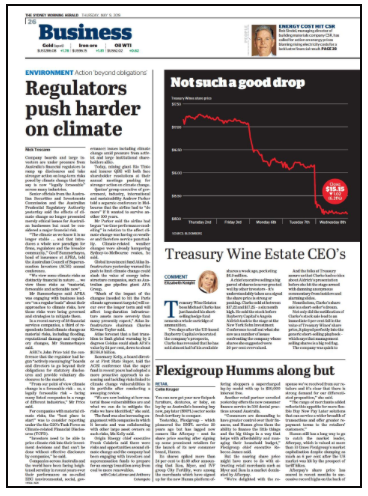 Australia now has a coherent and coordinated response from regulators on climate change as financial system risk. In May, media outlets once again picked up on CPD’s public forums with Australia’s financial regulators on climate risks, and the legal opinions we’ve commissioned on the responsibility of company directors. These included Katharine Murphy in The Guardian who pointed to critical CPD-backed interventions that have permanently and irreversibly raised the bar for Australian companies on climate risk, and Narelle Hooper in the Company Director Magazine who summarised the implications of these developments for corporates.
Australia now has a coherent and coordinated response from regulators on climate change as financial system risk. In May, media outlets once again picked up on CPD’s public forums with Australia’s financial regulators on climate risks, and the legal opinions we’ve commissioned on the responsibility of company directors. These included Katharine Murphy in The Guardian who pointed to critical CPD-backed interventions that have permanently and irreversibly raised the bar for Australian companies on climate risk, and Narelle Hooper in the Company Director Magazine who summarised the implications of these developments for corporates.
Roundtable: Bangladesh and its Emerging Role in the Region
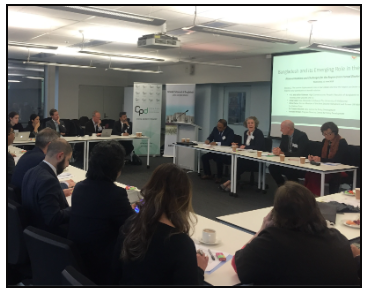 On 12 June we were pleased to co-host a roundtable discussion with the Bangladesh High Commission on ‘Bangladesh and its Emerging Role in the Region: Bilateral Relations and Challenges for the Region from Forced Displacement’. Joining our team were H.E. Sufiur Rahman (Bangladesh High Commissioner to Australia, New Zealand & Fiji), Chris Carter (former Senior UN Advisor for Rakhine State), Erika Feller (Vice Chancellor’s Fellow at the University of Melbourne), Andrew Collins (DFAT South Asia Branch) and Nicholas Farrelly (ANU College of Asia and the Pacific). This important and wide-ranging discussion explored opportunities for Australia-Bangladesh relations and how the region can better respond to the displacement crisis in Cox’s Bazar — reflecting the priorities of our Asia Dialogue on Forced Migration.
On 12 June we were pleased to co-host a roundtable discussion with the Bangladesh High Commission on ‘Bangladesh and its Emerging Role in the Region: Bilateral Relations and Challenges for the Region from Forced Displacement’. Joining our team were H.E. Sufiur Rahman (Bangladesh High Commissioner to Australia, New Zealand & Fiji), Chris Carter (former Senior UN Advisor for Rakhine State), Erika Feller (Vice Chancellor’s Fellow at the University of Melbourne), Andrew Collins (DFAT South Asia Branch) and Nicholas Farrelly (ANU College of Asia and the Pacific). This important and wide-ranging discussion explored opportunities for Australia-Bangladesh relations and how the region can better respond to the displacement crisis in Cox’s Bazar — reflecting the priorities of our Asia Dialogue on Forced Migration.
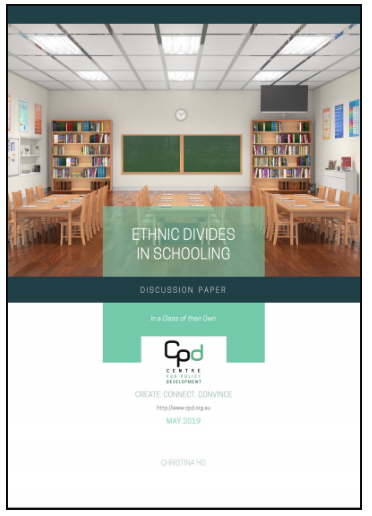 In late May, CPD published the fourth discussion paper in our In a Class of their Own series, written by Christina Ho. The paper reveals that Australian schools do not reflect the ethnic diversity of their communities and that there is a divide in educational outcomes among ethnically diverse students. The series explores different facets of Australia’s school system and how it concentrates advantage and disadvantage. The latest paper shows that among students with a language background other than English, we can see these same clusters of disadvantage, further exacerbating the growing inequality in educational outcomes and experiences. You can find the full paper here.
In late May, CPD published the fourth discussion paper in our In a Class of their Own series, written by Christina Ho. The paper reveals that Australian schools do not reflect the ethnic diversity of their communities and that there is a divide in educational outcomes among ethnically diverse students. The series explores different facets of Australia’s school system and how it concentrates advantage and disadvantage. The latest paper shows that among students with a language background other than English, we can see these same clusters of disadvantage, further exacerbating the growing inequality in educational outcomes and experiences. You can find the full paper here.
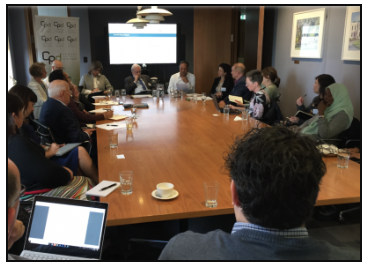 On 14 May, we continued our ANU-CPD Policy Dialogue series, looking at future of humanitarian settlement in Australia and our region. The event featured opening remarks from Abul Rizvi (Former Senior Official, Commonwealth Department of Immigration), Kate O’Malley (Senior Policy Advisor to the UNHCR Multi-Country Representation in Canberra), Paris Aristotle AO (CEO, Victorian Foundation for Survivors of Torture) and our Senior Project Manager, Lisa Button. The Dialogue explored current challenges and opportunities in domestic settlement policy as well as the need to better connect settlement policy and programming to a more proactive approach to displacement in the region. You can find a full summary here.
On 14 May, we continued our ANU-CPD Policy Dialogue series, looking at future of humanitarian settlement in Australia and our region. The event featured opening remarks from Abul Rizvi (Former Senior Official, Commonwealth Department of Immigration), Kate O’Malley (Senior Policy Advisor to the UNHCR Multi-Country Representation in Canberra), Paris Aristotle AO (CEO, Victorian Foundation for Survivors of Torture) and our Senior Project Manager, Lisa Button. The Dialogue explored current challenges and opportunities in domestic settlement policy as well as the need to better connect settlement policy and programming to a more proactive approach to displacement in the region. You can find a full summary here.
Other Highlights
* A rundown of the third meeting of our Council on the Economic Participation for Refugees — held over two days in Canberra in April — is now available on our website here.
* CPD Senior Project Manager, Lisa Button joined a panel at CoAct’s ConnectUp Conference in Brisbane this week, exploring how Australia can develop a successful and sustainable employment services program that works for both Australian employers and job seekers. She focussed on disadvantaged jobseekers and the need to tailor services to local communities.
The post Latest eNews appeared first on Centre for Policy Development.
Bangladesh and its Emerging Role in the Region | ROUNDTABLE | June 2019
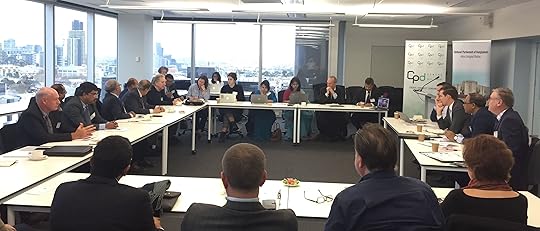
Yesterday, CPD co-hosted a special roundtable event with the Bangladesh High Commission on ‘Bangladesh and its Emerging Role in the Region: Bilateral Relations and Challenges for the Region from Forced Displacement’ in Melbourne.
We were fortunate to have a terrific line up of speakers and panellists, including H.E. Sufiur Rahman (High Commissioner of Bangladesh to Australia, New Zealand and Fiji), Chris Carter (former Member of the New Zealand Parliament and Senior UN Advisor for Rakhine State), Erika Feller (Vice Chancellor’s Fellow at Melbourne University and former UNHCR Assistant High Commissioner) Andrew Collins (Assistant Secretary, South Asia Branch, DFAT), Nicholas Farrelly (Associate Dean in the ANU College of Asia and the Pacific) and Travers McLeod (CEO, Centre for Policy Development) and Annabel Brown (Program Director, Centre for Policy Development).
The half-day roundtable discussion focused on two main topics:
a) Emerging Bangladesh and opportunities for diversifying and strengthening the Australia-Bangladesh relationship;
b) Forced migration and other regional challenges in the Bay of Bengal, and how the region can better respond to the current displacement crisis, contribute to a durable solution and avoid regional instability.
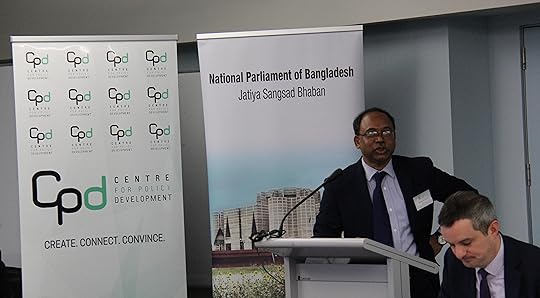
Bangladesh has made significant social and economic progress in recent years, staking its claim as an emerging middle power. It has seen persistent economic growth in the range of 6-7% in the last decade. This growing economy and its relevance on the regional stage create new opportunities for bilateral engagement between Australia and Bangladesh.
Amidst this considerable economic progress, Bangladesh is also effectively managing the largest displacement crisis in the region: the influx of over 700,000 Rohingya who have fled violence in Rakhine State, Myanmar since August 2017. Comprehensive and coordinated regional response is essential to both support the emergency response, and contribute to a durable solution in Rakhine State.
Thirty people from government, civil society, business and academia participated in the roundtable, which was also kindly supported by the Peter McMullin Centre on Statelessness at the University of Melbourne.
The post Bangladesh and its Emerging Role in the Region | ROUNDTABLE | June 2019 appeared first on Centre for Policy Development.
May 30, 2019
Ethnic Divides in Schooling | DISCUSSION PAPER | May 2019

Introduction
Australian schools are more culturally diverse than ever. Many decades of migration, from increasingly diverse source countries, have created a rich mix of students in our schools, particularly in major urban areas. In New South Wales (NSW) government schools, approximately one third of students come from a language background other than English (LBOTE), speaking more than 230 different languages (NSW DoE 2018). In Victorian government schools, 27 per cent of students are from a LBOTE and 13 per cent are English as an Additional Language (EAL) learners (Vic DET 2018).
This discussion paper examines the impact of increasing cultural diversity on our education system in two main arenas: firstly, variation of educational outcomes of LBOTE students and, secondly, enrolment in schools. In both cases, ethnicity is mediated by social class, and indeed, divisions and inequalities that may initially seem to be explained by ethnic difference are often in fact about unequal access to the economic and other resources required for educational success.
Using My School data, the analysis shows varying educational outcomes of students from a language background other than English (LBOTE). At one end of the spectrum, the high-achieving children of skilled Asian migrants are now highly visible in selective schools and classes and on Year 12 honour lists. On average, 83% of students in Sydney’s fully selective schools are from a LBOTE. However, the stereotype of the ‘Asian high achiever’ masks the enormous diversity of experiences of LBOTE students, and the continued disadvantage faced by many of these students. Other students from migrant backgrounds are concentrated in lower-income areas and continue to experience disadvantage. Sydney has 125 schools where more than 90% of students are from a LBOTE. These schools are concentrated in western and south-western Sydney, are more likely to be socio-economically disadvantaged, and are below average in terms of academic performance.
The mixed experience of LBOTE students is also reflected in school enrolments. Even in our multicultural capital cities, there are some schools with barely any LBOTE students, and other schools with large majorities of students from a LBOTE. To a significant extent, this reflects the uneven distribution of migrants across our suburbs, but as this discussion paper shows, the schools themselves do not reflect the cultural diversity of their communities. There are also striking divisions between government and non-government schools in their enrolment of LBOTE students. Sydney, for example, has 99 schools with a student LBOTE population of less than 10%, and they are largely non-government schools and clustered in the North Shore and Eastern Suburbs. These schools are much less culturally diverse than the suburbs in which they are located.
Many of these ‘ethnic divides’ reflect official policies encouraging school choice, which enable families to bypass their local school in search of a ‘better’ school or student cohort. Schools now exist in a marketplace increasingly characterised by competition and hierarchies, which tends to disadvantage families with lower levels of financial or cultural capital. In a multicultural society, schools have a vital role to play in ensuring that all young Australians have the knowledge and skills they need to be active citizens, and to operate in a globalising world. However, this discussion paper shows that increasing inequality and division are undermining our schools’ capacity to build these qualities in the next generation.
This paper is the fourth discussion paper in CPD’s In a Class of Their Own series on disadvantage in Australia’s schools. The series explores different facets of Australia’s contemporary school system and how it impacts students, families and communities.
Key Documents
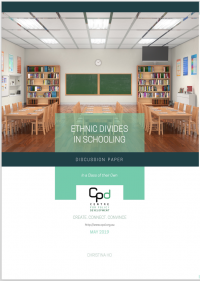
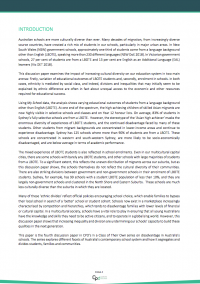
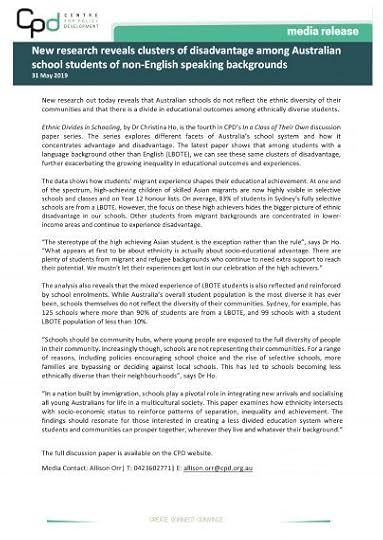
Full discussion paper
Introduction
Media release
Key links and related reading
Separating Scholars, CPD Discussion Paper 2019, Chris Bonnor
Institutionalised Separation, CPD Discussion Paper 2018, Christina Ho in association with Chris Bonnor.
A Creeping Indigenous Separation, CPD Discussion Paper 2018, Chris Bonnor, Christina Ho and Garry Richards.
‘Winners and losers’: school shopping widens education gap, The Sydney Morning Herald, Jordan Baker.
The gap between wealthy and disadvantaged schools is widening, research shows, SBS News, Maani Truu,
Has Gonski stepped outside the square?, Inside Story, Chris Bonnor.
Selective school decisions coming back to haunt us, The Sydney Morning Herald, Christina Ho and Chris Bonnor.
Losing The Game: State of our Schools in 2017, CPD Report 2017, Chris Bonnor and Bernie Shepherd.
Uneven playing field: the state of Australia’s schools, CPD Report 2016, Chris Bonnor and Bernie Shepherd.
Selective schools must promote equity and inclusion, The Sydney Morning Herald, Editorial.
‘I can see why people are worried’: Have we hit peak selective?, The Sydney Morning Herald, Jordan Baker.
The post Ethnic Divides in Schooling | DISCUSSION PAPER | May 2019 appeared first on Centre for Policy Development.
May 16, 2019
The future of humanitarian settlement I ANU-CPD Policy Dialogue I May 2019
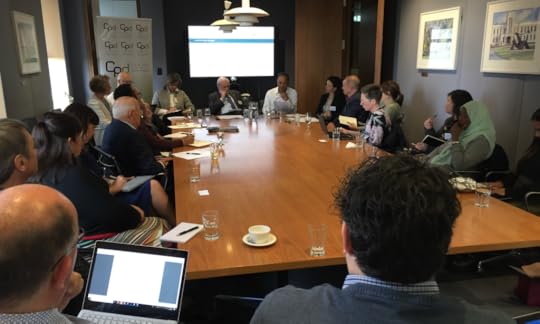
On 14 May, we hosted our second ANU-CPD Policy Dialogue for 2019 on the future of humanitarian settlement. The event featured opening remarks from Abul Rizvi (Former Senior Official, Commonwealth Department of Immigration), Kate O’Malley (Senior Policy Advisor to the UNHCR Multi-Country, Representation in Canberra), Paris Aristotle AO (CEO, Victorian Foundation for Survivors of Torture) and Lisa Button (Senior Project Manager, Centre for Policy Development).
The roundtable was hosted and moderated by ANU Chancellor and former Foreign Minister, the Hon Gareth Evans AC QC, and brought together 25 leaders from government, business, civil society and academia.
It’s a pivotal time for Australia’s approach to humanitarian settlement. Last year’s review of employment services was followed closely by a review led by Peter Shergold ACinto Integration, Employment and Settlement Outcomes for Refugees and Humanitarian Entrants. Research by CPD has highlighted the enormous benefits for individuals, families and Australian society if we can help refugees to settle better.
Ahead of the federal election, this Policy Dialogue explored the opportunities inherent in connecting settlement policy and programming in Australia to a more proactive approach to displacement in the region.
Opening remarks
Abul Rizvi opened the discussion describing the three major groups of humanitarian migrants in Australia. He highlighted the challenges of Australia’s current humanitarian settlement program and bemoaned that Australia has lost its way of explaining to the wider public our involvement in humanitarian settlement and educating them on the issue.
Kate O’Malley provided background on the global context of resettlement needs, drawing on her experience working in Geneva and recently returning to Australia. She also highlighted some of the now lost nuance around humanitarian migration as distinct from resettlement. She explained that Australia has a long tradition as a resettlement country, but despite the increase in the program, the quota for UNHCR referred refugees is now at its lowest.
Paris Aristotle AO focussed on what a good structure for Australia’s settlement program might look like, and how we might link the aspiration of having a world-best settlement to how we think about settlement in Australia. He also addressed how Australia might connect a bigger focus on displacement in the region to our domestic approach to settlement.
Lastly, Lisa Button outlined what this means at the local and community level. She provided insights in relation to the challenges of economic participation for humanitarian migrants drawn from CPD’s Cities & Settlement (CSI) initiative. She outlined the need for interventions that assist humanitarian migrants to develop greater social capital and the role that community sponsorship can play in encouraging greater community understanding of and engagement with newly-arrived refugees.
The following discussion touched on:
The biggest opportunities after the election.
Why changing the narrative around the issue matters and how Australia can benefit by getting this right.
How Australia’s approach to humanitarian settlement connects to Australia’s approach to human displacement in the region and globally.
Opportunities of a global compact.
Participants:
Abul Rizvi (Former Senior Official, Commonwealth Department of Immigration),Annabel Brown (Program Director, Centre for Policy Development),Anthea Hancocks(CEO, Scanlon Foundation), Asher Hirsch (Senior Policy Officer at the Refugee Council of Australia), Carmel Guerra OAM (CEO, Centre for Multicultural Youth),Clifford Eberly (Social and Economic Inclusion Lead, Wyndham City Council), Dean Wickham (Executive Officer, Sunraysia Mallee Ethnic Communities Council (SMECC)), Gabby Lam (Grants Coordinator, Australian Communities Foundation), Gareth Evans AC, QC (Chancellor, ANU),James Button (Former journalist and speechwriter), Jessica Del Rio (Branch Manager, Settlement Policy Branch, Commonwealth Department of Social Services),John Cameron (Founder, Talent Beyond Boundaries Australia), John Roc (Deputy Chair, Durable Solutions Working Group, APRRN), Kate O’Malley(Senior Policy Advisor to the UNHCR Multi-Country Representation in Canberra), Katrina Currie (Executive Director, Employment at Department of Jobs, Precincts and Regions, Victoria),Kerrin Benson (CEO, Multicultural Development Association), Lisa Button (Senior Project Manager, Centre for Policy Development), Loga Chandrakumar (Director, Outcomes, Performance and Risk at Department of Health & Human Services, Victoria),Nivy Balachandran (Director of Operations and Client Services, Cultural Infusion), Paris Aristotle AO (CEO, Victorian Foundation for Survivors of Torture), Peter Mousaferiadis (CEO and Founder, Cultural Infusion), Professor Andrew Markus (Director of the Australian Centre for Jewish Civilisation), Sonja Hood (CEO, Community Hubs),Sufiur Rahman (High Commissioner, People’s Republic of Bangladesh to Australia, New Zealand and Fiji).
Speaker profiles:
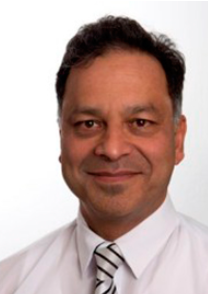
Abul Rizvi
Abul Rizvi was a senior official in the Department of Immigration from the early 1990s to 2007when he left as Deputy Secretary. He is currently doing a PhD on Australia’s immigration policies. He frequently provides media comment and opinion articles on developments in immigration policy.

Kate O’Malley
Kate O’Malley is the Senior Policy Advisor to the United Nations High Commissioner for Refugees (UNHCR)Multi-Country Representation in Canberra.Prior to this she held two global UNHCR roles. During 2018 she was Senior Consultant on Resettlement Partnerships engaged in promoting third-country solutions for refugees to advance the Global Compact on Refugees, and between 2015 and 2017 she led UNHCR’s global Resettlement Service in its Geneva Headquarters working closely with more than 30 resettlement countries and a broad range of international stakeholders.

Paris Aristotle AO
[image error]Paris Aristotle AO is the Chief Executive Officer of the Victorian Foundation for Survivors of Torture Inc., also known as Foundation House. Paris has over 30 years’ experience in the field of supporting refugees and asylum seekers, particularly the provision of services to survivors of torture and trauma.
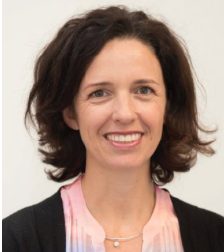
Lisa Button
Lisa is Senior Project Manager at the Centre for Policy Development. She is currently working to develop new approaches to boosting refugee economic participation in Australia, including through place-based approaches and encouraging greater employer engagement.
The post The future of humanitarian settlement I ANU-CPD Policy Dialogue I May 2019 appeared first on Centre for Policy Development.
April 17, 2019
Latest eNews
Dear CPD follower
We hope this finds you well and all set for the Easter break. We’ve had an action-packed first quarter of 2019, and we’re excited to share with you what we’ve been working on:
New report ‘Seven Steps to SUCCESS’ on refugee entrepreneurship
Updated legal opinion on company directors’ duties and climate change
Third meeting of the Council on Economic Participation for Refugees
Terry Moran AC delivers 2019 Jim Carlton Integrity Lecture
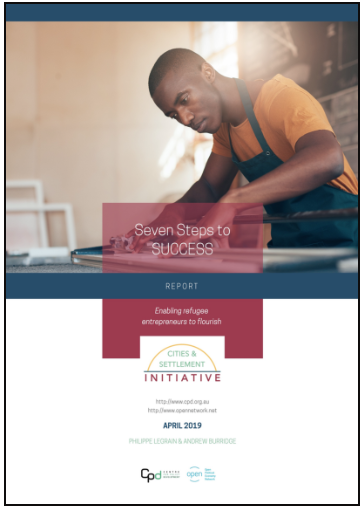 Last week, we released our new report ‘Seven Steps to SUCCESS: Enabling Refugee Entrepreneurs to Flourish’, by Philippe Legrain (Open Political Economy Network) and Andrew Burridge (CPD). The research draws on Australian and international best practice on how to support refugee entrepreneurs better. A key finding is that despite the huge challenges they face, refugees are the most entrepreneurial migrants in Australia – and nearly twice as likely to be entrepreneurs as Australian taxpayers. The findings and recommendations are significant in what is set to be a big year for the future of Australia’s settlement and employment services. The full report and a related op-ed are here.
Last week, we released our new report ‘Seven Steps to SUCCESS: Enabling Refugee Entrepreneurs to Flourish’, by Philippe Legrain (Open Political Economy Network) and Andrew Burridge (CPD). The research draws on Australian and international best practice on how to support refugee entrepreneurs better. A key finding is that despite the huge challenges they face, refugees are the most entrepreneurial migrants in Australia – and nearly twice as likely to be entrepreneurs as Australian taxpayers. The findings and recommendations are significant in what is set to be a big year for the future of Australia’s settlement and employment services. The full report and a related op-ed are here.
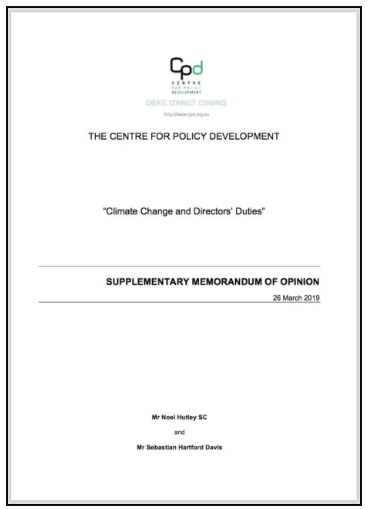 In March, CPD released an update of a landmark 2016 legal opinion on how Australian law requires company directors to consider, disclose and respond to climate-related risks. The supplementary opinion, provided again by Noel Hutley SC and Sebastian Hartford Davis, on instruction from Sarah Barker at MinterEllison Lawyers, reinforces and strengthens the 2016 findings. It emphasises five material developments since 2016 that have elevated the need for directors to consider climate risks and opportunities and reinforced the urgency of improved board-level governance of this issue. The full opinion, media coverage and other supporting documents are available here.
In March, CPD released an update of a landmark 2016 legal opinion on how Australian law requires company directors to consider, disclose and respond to climate-related risks. The supplementary opinion, provided again by Noel Hutley SC and Sebastian Hartford Davis, on instruction from Sarah Barker at MinterEllison Lawyers, reinforces and strengthens the 2016 findings. It emphasises five material developments since 2016 that have elevated the need for directors to consider climate risks and opportunities and reinforced the urgency of improved board-level governance of this issue. The full opinion, media coverage and other supporting documents are available here.
Third meeting of Council on the Economic Participation for Refugees in Canberra
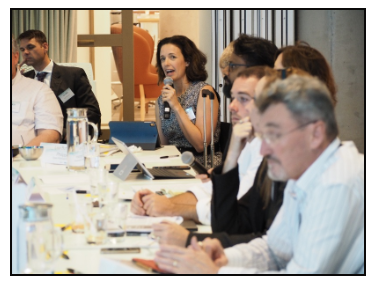 Last week in Canberra, alongside the launch of Seven Steps to SUCCESS, CPD convened the third Council on Economic Participation for Refugees meeting. Peter Shergold AC, who led the Review of Integration, Employment and Settlement Outcomes for Refugees and Humanitarian Entrants, was among a number of senior participants. Council discussions revealed strong support for a national centre of gravity for humanitarian settlement and for community deals (or place-based approaches) to boost economic and social inclusion. There was clear recognition of the benefits for individuals, families and Australian society if we help refugees to settle better. More details about the meeting are available here.
Last week in Canberra, alongside the launch of Seven Steps to SUCCESS, CPD convened the third Council on Economic Participation for Refugees meeting. Peter Shergold AC, who led the Review of Integration, Employment and Settlement Outcomes for Refugees and Humanitarian Entrants, was among a number of senior participants. Council discussions revealed strong support for a national centre of gravity for humanitarian settlement and for community deals (or place-based approaches) to boost economic and social inclusion. There was clear recognition of the benefits for individuals, families and Australian society if we help refugees to settle better. More details about the meeting are available here.
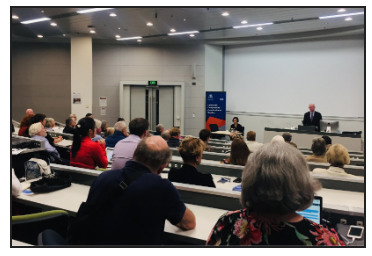 CPD Chairperson Terry Moran AC delivered the 2019 Jim Carlton Integrity Lecture on ‘The next long wave of reform — where will the ideas come from?’ at the Accountability Roundtable on 25 March. Terry proposed five key steps and a ‘missions mindset’ for the Review of the Australian Public Service. The speech and coverage are available here.
CPD Chairperson Terry Moran AC delivered the 2019 Jim Carlton Integrity Lecture on ‘The next long wave of reform — where will the ideas come from?’ at the Accountability Roundtable on 25 March. Terry proposed five key steps and a ‘missions mindset’ for the Review of the Australian Public Service. The speech and coverage are available here.
Other Highlights
* CPD Board Member Sam Mostyn returned to her alma mater, the Australian National University, on 8 March to deliver the 2019 International Women’s Day lecture. You can find a full video recording of her speech here.
* CPD’s attitudes research on what Australians want from our democracy was featured in the latest Quarterly Essay. Australia Fair – Listening to the Nation by Rebecca Huntley.
* CPD Senior Adviser Arjuna Dibley presented at the World Bank’s Carbon Pricing Leadership Coalition Research Conference in February in New Delhi.
Other CPD Highlights
* Our Policy Director Sam Hurley and Board Member Sam Mostyn spoke at the Green Building Council of Australia’s TRANSFORM conference.
* Sam Hurley also unpacked the implications of the RBA’s recent statement on climate change and the economy in the Sydney Morning Herald.
* CPD Senior Adviser Arjuna Dibley gave his take on how to talk to a populist about climate change in Foreign Policy.
* Our CEO Travers McLeod spoke with The World Today about the updated Hutley opinion on climate change, and to the Australian Financial Review about the lapse of the parliamentary committee inquiry into government consulting without a report being issued.
The post Latest eNews appeared first on Centre for Policy Development.
Third Meeting | Council on Economic Participation for Refugees | April 2019
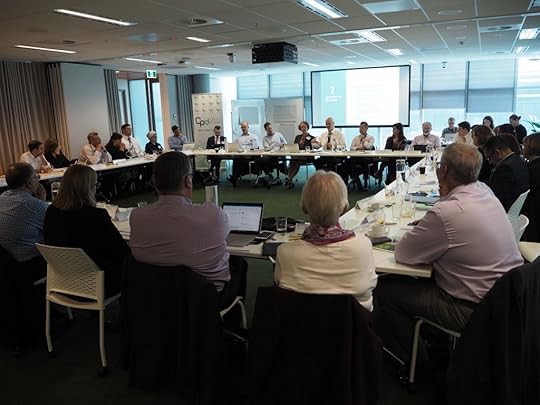
Key documents:
Agenda
Participants list
Briefing material
Meeting summary (available shortly)
The third meeting of the Council on Economic Participation for Refugees was held on 11/12 April 2019 at the Canberra office of the Boston Consulting Group. The meeting was timely. It started on the day Prime Minister Scott Morrison called the next Federal election and after a number of national policy reviews critical to the Council’s work. These developments combined to ensure a concerted focus on opportunities to boost the economic and social participation of humanitarian migrants in Australia.
The objectives of the third Council meeting were to:
Build momentum and an implementation pathway for governance, policy and programming reforms to boost integration, employment and settlement outcomes for refugees, including the priorities of:
a centre of gravity within the federal government for relevant services including employment, language and settlement services, with appropriate links to state and local governments
place-based approaches to achieving greater economic and social participation for refugees involving holistic support, employer engagement and coordination of key services including employment, language and settlement, and
greater employer engagement in boosting sustainable employment for refugees.
Inaugural meeting of the Local Areas Strategic Partnership group including sharing of recent developments in Wyndham, approaches taken in other local government areas and further refinement of a place-based framework for refugee economic and social inclusion.
Launch Seven Steps to SUCCESS – a research report on supporting refugee entrepreneurship in Australia, which builds understanding of the huge potential of refugee entrepreneurs and outlines a strategic approach to supporting them.
Overview of Council meeting
1/ There was consensus regarding the importance of establishing a federal centre of gravity in humanitarian settlement policy and significant appetite for progressing it in practice. This would provide a concentrated point of accountability for policy development and resource allocation. Core functions of the centre of gravity would include setting shared outcomes, aligning policy implementation and driving integrated service delivery. The policy areas and programs to be included would be, at a minimum, settlement, language and employment services.
2/ There was overwhelming support for long-term ‘community deals’ – place-based approaches that harness federal, state and local efforts to boost economic participation of refugees. Local flexibility in the delivery of mainstream services would be a highly desirable feature. We identified ways to overcome hurdles to the implementation of these approaches in key locations and were encouraged by the commitment and motivation of the group to see this happen.
3/ We shared and discussed the preliminary findings of our research with Australian employers on refugee employment undertaken in collaboration with BCG and the University of Sydney. This work will culminate in the publication of a full report, with policy recommendations, in the second half of 2019.
4/ We launched Seven Steps to SUCCESS– a report on supporting refugee entrepreneurship published by CPD and the Open Political Economy Network.
5/ The Local Area Strategic Partnership Group had its inaugural meeting. This group, convened by CPD, brings together a number of local government authorities, other local anchor organisations and thought leaders from across Australia to: (i) share promising practices from communities where humanitarian migrants settle in large numbers; (ii) develop trials and research initiatives; and (iii) collectively engage with federal and state government on matters relating to refugee participation in their communities. Representatives from Fairfield (NSW), Stirling (WA), Wyndham (Vic), Hume (Vic), Whittlesea (Vic) and Darling Downs and South West QLD were in attendance, with Armidale (NSW) also remaining engaged with the Cities and Settlement Initiative.
An underlying theme that flowed through all parts of the Council meeting was a shared understanding of the great benefits that flow to individuals, families and Australian society as a whole when we ensure refugees coming to Australia have the best start possible. That’s why the overall objective of CPD’s Cities and Settlement Initiative — settling refugees better, by helping them to find jobs or start businesses faster in the places they are settling most — is so important.
The post Third Meeting | Council on Economic Participation for Refugees | April 2019 appeared first on Centre for Policy Development.
April 10, 2019
Seven Steps to SUCCESS: Enabling Refugee Entrepreneurs to Flourish | REPORT | April 2019
Today CPD and Open Political Economy Network (OPEN) have released a new report, Seven Steps to SUCCESS: Enabling Refugee Entrepreneurs to Flourish. The report was written by Philippe Legrain, founder of OPEN, and Andrew Burridge, CPD Research Coordinator. It draws on Australian and international best practice to outline policy recommendations to government, business and civil society on how to better support refugee entrepreneurs.
Key findings
Despite the huge challenges they face, refugees are the most entrepreneurial migrants in Australia – they and nearly twice as likely to be entrepreneurs as Australian taxpayers as a whole.
Contrary to popular belief, female refugees are more likely to report income from their own business than men.
While some promising ventures supporting refugee entrepreneurship exist, these are largely confined to Melbourne and Sydney, and are limited in scale and funding. Australia is only scratching the surface of what refugee entrepreneurs could achieve with appropriate investment and support.
An ambitious but achievable target of launching 1,000 new refugee-run businesses each year could yield $98 million in annual economic and fiscal gains. Within ten years, the boost to the economy could be nearly $1 billion a year. The social benefits would also be significant.
To improve support to refugee entrepreneurs, the report outlines Seven Steps to SUCCESS.
Key recommendations
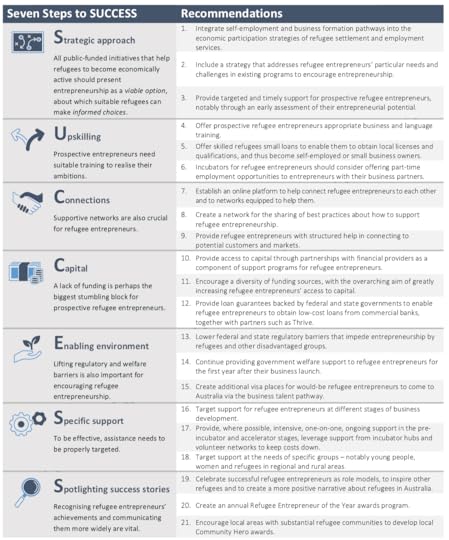
Seven Steps to SUCCESS has been developed under the umbrella of CPD’s Cities and Settlement Initiative, a three-year program that aims to improve the economic and social participation of refugees in Australia. The Initiative makes the case for more effective settlement, employment and related services across the board. An important part of this agenda is greater and more strategic support for refugee entrepreneurs, while recognising that it is only one potential pathway through which refugees may participate in the economy.
The findings in the report are particularly significant as it is shaping up to be a big year for the future of Australia’s employment and settlement services. The Employment Services Expert Advisory Panel’s report I Want to Work, was released in December 2018. The findings of the Shergold Review into Integration, Employment and Settlement Outcomes for Refugees and Humanitarian Entrants are expected to be released soon.
Seven Steps to SUCCESS was launched at a special event in Canberra on Thursday 11 April, to coincide with the third meeting of the Council on Economic Participation for Refugees.
The full report, along with a CPD media release and other supporting documents are available below.
Key documents
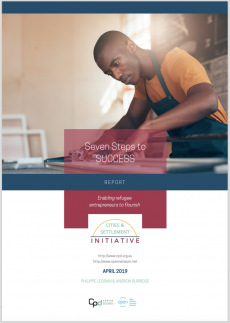
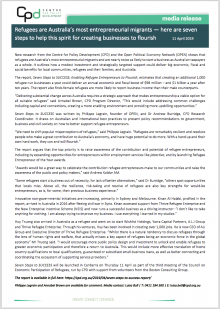
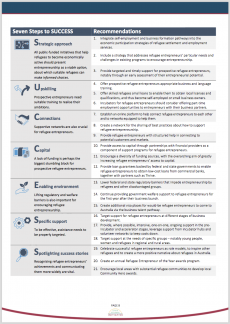
Full report
CPD Media Release
Seven Steps to SUCCESS Recommendations
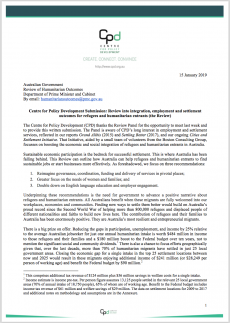
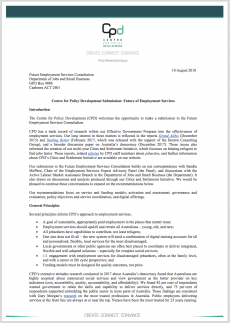
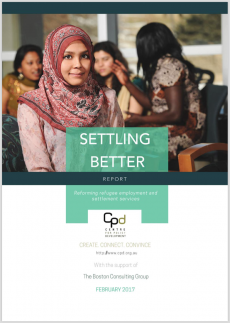
CPD Submission – Shergold Review
CPD Submission – The future of Employment Services
Settling Better report
Media coverage
The potential of refugee entrepreneurs is huge. But they need our help, The Guardian, Philippe Legrain, 11 April 2019.
Boosting Refugee Jobs Would Be A Win-Win For Australia, The Huffington Post, Henry Sherrell and Travers McLeod.
Finding jobs faster for new refugees a ‘triple win’ for Australia, report finds, The Guardian, Ben Doherty.
Related reading
Cities and Settlement Initiative
The Council on Economic Participation for Refugees
Settling Better: Reforming refugee employment and settlement services, Henry Sherrell, February 2017
A Significant Contribution: The Economic, Social and Civic Contributions of First and Second Generation Humanitarian Entrants, Department of Immigration and Citizenship, 2011.
Building a New Life in Australia: The Longitudinal Study of Humanitarian Migrants, Department of Social Services, 2015.
The Authors
 Philippe Legrain is a critically acclaimed writer and thinker. A political economist, he is the founder of Open Political Economy Network (OPEN), an international think tank on refugee, migration and other openness issues, and a senior visiting fellow at the London School of Economics and Political Science’s European Institute. He is also a commentator for Project Syndicate, Foreign Policy, BBC, Al Jazeera and other international media outlets.
Philippe Legrain is a critically acclaimed writer and thinker. A political economist, he is the founder of Open Political Economy Network (OPEN), an international think tank on refugee, migration and other openness issues, and a senior visiting fellow at the London School of Economics and Political Science’s European Institute. He is also a commentator for Project Syndicate, Foreign Policy, BBC, Al Jazeera and other international media outlets.
From 2011 to 2014 he was economic adviser and head of the team providing strategic policy advice to European Commission President José Manuel Barroso. Previously, he was special adviser to World Trade Organisation Director-General Mike Moore and trade and economics correspondent for The Economist.
Philippe is the author of four best-selling books, notably Immigrants: Your Country Needs Them (Abacus, 2007), which was shortlisted for the Financial Times Business Book of the Year award.
His two previous studies on refugee economic participation for OPEN and the Tent Foundation are Refugees Work: A humanitarian investment that yields economic dividends (2016) and Step Up: How to get refugees into work quickly (2017).
 Andrew Burridge is an urban and political geographer who specialises in undocumented migration, the effects of border securitisation and immigration detention, and refugee reception and settlement. A lecturer in human geography and the convenor of the inter-departmental refugee studies major at Macquarie University, he is also research coordinator for the Cities and Settlement Initiative at the Centre for Policy Development (CPD).
Andrew Burridge is an urban and political geographer who specialises in undocumented migration, the effects of border securitisation and immigration detention, and refugee reception and settlement. A lecturer in human geography and the convenor of the inter-departmental refugee studies major at Macquarie University, he is also research coordinator for the Cities and Settlement Initiative at the Centre for Policy Development (CPD).
From 2013 to 2016, he was based at the University of Exeter, where he was lead researcher on a project that investigated how asylum-seeker appeal outcomes in the UK vary across different tribunal locations. The project was a finalist in the Economic and Social Research Council (ESRC) Celebrating Impact prize for outstanding impact on public policy. From 2010 to 2013, he was a member of the International Boundaries Research Unit, a consultancy based at Durham University that works to minimise conflict associated with international land and sea boundaries.
Andrew received his PhD from the University of Southern California in 2009, where he focused on humanitarian aid practices in the Mexico-US borderlands. He is co-editor of the collection Beyond Walls and Cages: Prisons, borders and global crisis (UGA Press, 2012).
The post Seven Steps to SUCCESS: Enabling Refugee Entrepreneurs to Flourish | REPORT | April 2019 appeared first on Centre for Policy Development.
March 28, 2019
Updated Hutley opinion on directors’ duties and climate risk
Full supplementary memorandum of opinion here
Today CPD has released an update of a landmark 2016 legal opinion on how Australian law requires company directors to consider, disclose and respond to climate change.
Summary of findings
The original Hutley opinion, which we commissioned and released in 2016 after extensive consultation with business leaders and legal experts, found that directors who do not properly manage climate risk could be held liable for breaching their legal duty of due care and diligence.
The supplementary opinion, provided again by Noel Hutley SC and Sebastian Hartford Davison on instruction from Sarah Barker at MinterEllison Lawyers, reinforces and strengthens the 2016 findings. It emphasises five material developments since 2016 that have elevated the need for directors to consider climate risks and opportunities and reinforced the urgency of improved board-level governance of this issue. These five developments are:
Coordinated engagement by financial regulators on climate: The opinion highlights recent
statements on climate risk by APRA, ASIC and the Reserve Bank as evidence of “striking” alignment between Australia’s regulators on “the financial and economic significance of climate change.”
New reporting frameworks: The opinion highlights three major advances in financial reporting frameworks relevant to the disclosure of climate risk: the final recommendations of the Taskforce for Climate-related Financial Disclosures; new recommendations on assessing climate risk materiality from the Australian Accounting Standards Board and the Auditing and Assurance Standard Board; and updated guidance on climate disclosures from the ASX Corporate Governance Council.
Investor and community pressure: The opinion notes that “investor and community pressures concerning climate risk are becoming more acute”, highlighting shareholder actions on corporate climate targets and disclosures and co-ordinated efforts by institutional investors to target improvements by major emitters.
Advances in scientific knowledge: The opinion recognises “notable developments in the state of scientific knowledge that bear upon the gravity and probability of climate risks which directors need to consider.” These include comprehensive information and evidence presented by the IPCC’s 2018 special report on global warming of 1.5 degrees.
Increased litigation risks: The opinion cites important developments relevant to litigation risks, including advances in “event attribution science” that can identify the link between climate change and individual extreme weather events.
The advice concludes that: “In our opinion, these matters elevate the standard of care that will be expected of a reasonable director. Company directors who consider climate change risks actively, disclose them properly and respond appropriately will reduce exposure to liability. But as time passes, the benchmark is rising.“
The full supplementary opinion, along with a CPD media release and other supporting documents are available below.
Key documents
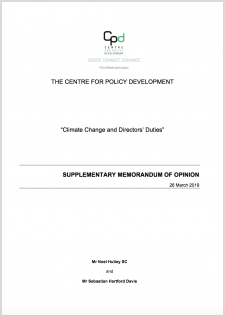
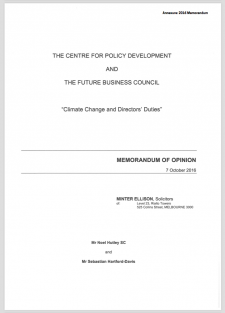
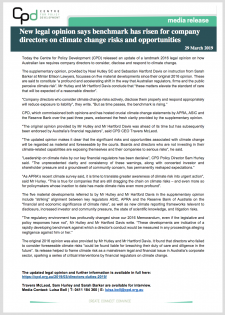
Hutley opinion 2019
Hutley opinion 2016
CPD Media Release
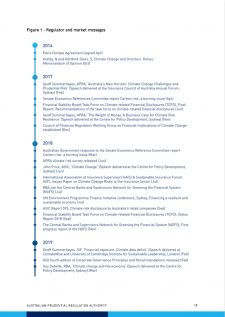
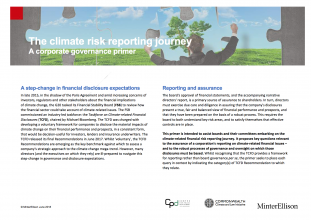
APRA timeline of key developments
Climate Risk primer for directors
Key quotes from 2019 opinion
“[W]e are now observers of a profound and accelerating shift in the way that Australian regulators, firms and the public perceive climate risk. There has been a series of coordinated interventions by Australian regulators, which will require in practice that increased attention be given to both the assessment and disclosure of climate risk. There has been acute interest in these issues from investor groups. There have been developments in the state of scientific knowledge. In our opinion, these matters elevate the standard of care that will be expected of a reasonable director. Company directors who consider climate change risks actively, disclose them properly and respond appropriately will reduce exposure to liability. But as time passes, the benchmark is rising.”
“The regulatory environment has profoundly changed since our 2016 Memorandum, even if the legislative and policy responses have not. These developments are indicative of a rapidly developing benchmark against which a director’s conduct would be measured in any proceedings alleging negligence against him or her.”
“It is apparent that regulators and investors now expect much more from companies than cursory acknowledgement and disclosure of climate change risks. In those sectors where climate risks are most evident, there is an expectation of rigorous financial analysis, targeted governance, comprehensive disclosures and, ultimately, sophisticated corporate responses at the individual firm and system level.”
“It is obvious that the risks differ, depending whether the transition is implemented gradually or abruptly. It is also obvious that the longer that it takes to implement appropriate transition measures, the greater the risk of an abrupt policy response. But the fact that there is a wide range of available outcomes will not excuse inaction”
“It is increasingly obvious that climate change is and will inevitably affect the economy, and it is increasingly difficult in our view for directors of companies of scale to pretend that climate change will not intersect with the interests of their firms. In turn, that means that the exposure of individual directors to “climate change litigation” is increasing, probably exponentially, with time.”
Media coverage
Directors’ climate liability exposure increasing ‘exponentially’, Ben Potter, Australian Financial Review, 29 March 2019
Climate change raising company liabilities, barristers warn, Peter Ryan, ABC RN The World Today, 29 March 2019
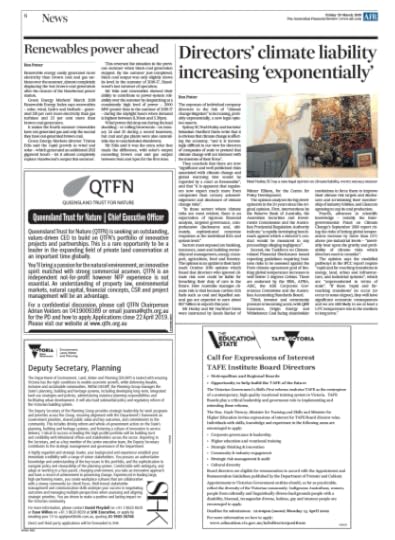
Related reading
Climate change and the economy, speech by RBA Deputy Governor Dr Guy Debelle, March 2019.
Climate change, speech by ASIC Commissioner John Price, June 2018
The weight of money: a business case for climate risk resilience, APRA Executive Member Geoff Summerhayes, November 2017
Heavyweights now speaking with one voice on climate change risks, Sam Hurley, The Age and The Sydney Morning Herald, 24 March 2019
Time for an Australian Sustainable Finance Taskforce, Travers McLeod and Sam Hurley, Sydney Morning Herald, 22 July 2019
CPD roundtable on directors duties, climate risks and sustainability, October 2016
Policy impact and implications
The original Hutley opinion and subsequent interventions on climate by financial regulators hosted by CPD have been part of a step-change in Australian responses to climate risk. APRA has repeatedly cited the Hutley opinion as one of the key developments that have led the prudential regulator to demand more sophisticated and concerted responses to climate risk. Similarly, ASIC has emphasised that the Hutley opinion reflects its understanding of the law and reinforces the case for “probative and proactive” consideration of climate risks.
Public statements on climate risk by APRA, ASIC and the Reserve Bank – hosted by CPD in 2017, 2018 and 2019 respectively – have significantly raised awareness and expectations on corporate responses to climate risk, and demonstrated greater focus and co-ordination between regulators on this key challenge.
While understanding of the materiality of climate-related risks has increased in recent years, many leading Australian institutions are still doing far too little to analyse and disclose these risks and respond accordingly.
Recent evidence points to a fragmented and inconsistent approach to climate risk governance and reporting. A September 2018 review by ASIC found that only 17% of 60 ASX 300 companies surveyed by ASIC had disclosed climate material climate risks to their business, and that broader voluntary disclosures were often “fragmented”, “too general” and “not comprehensive enough” to be useful for investors. A March 2019 survey by APRA found that while awareness of climate risk was increasing, only seven of 38 respondents from the banking, insurance and superannuation sectors had disclosed risks in line with the TCFD framework – and almost half did not intend to use the framework in future. APRA also found that only one-third of respondents had conducted climate scenario analysis, despite clear signals that using these scenarios is a critical element of a sophisticated response to climate risk:
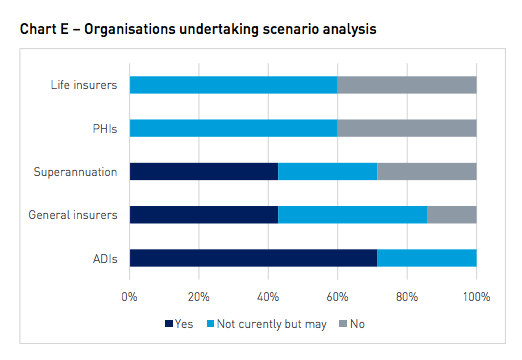
The fact that climate risks are becoming more pronounced makes slow progress translating talk on climate risk into action all the more concerning. Since the original Hutley opinion was released in 2016, Australia’s failure to accelerate emissions reductions and a prolonged period of policy inconsistency and uncertainty have made climate risks more significant and have increased the prospect of larger and more abrupt impacts and adjustments in future.
These trends have made governance and decision-making challenges for company boards on climate even more pressing. While the Hutley opinion makes a clear case that considering and disclosing climate risks is already required under existing Australian law, fragmented responses by companies so far strengthen the arguments for more onerous, mandatory requirements. As we argued in CPD’s Climate Horizons report in 2018:
“Strong stakeholder support for the TCFD recommendations reflects a broader consensus that getting consistent, accurate information on climate risk exposures into the marketplace is necessary to limit dangerous global warming and promote financial system stability. Regulatory and shareholder pressure to adopt the TCFD framework will drive better practice. Yet the need for better information is urgent, because time to respond to critical climate risks is short. Tougher responses must be considered, including more rigorous mandatory reporting requirements, if the TCFD approach fails to deliver quickly.”
Regulators themselves have acknowledged that expectations for better climate risk reporting are likely to be matched by more onerous mandatory requirements. In February 2019, APRA Executive Member Geoff Summerhayes, in his capacity of Chair of the global Sustainable Insurance Forum, noted that:
“[R]egulators’ current stance of merely encouraging climate-risk disclosure will inevitably harden towards making such disclosure mandatory.”
Australian policymakers should carefully consider the case for strengthening mandatory climate-related disclosures, and revisit other key recommendations from the Senate inquiry into carbon risk in 2017.
In addition, the government should seize the opportunity to review directors and fiduciary duties on climate and other sustainability issues in the context of a much more sophisticated and strategic global approach to green and sustainable finance. While the legal position of directors is critical and climate-related disclosures are a key issue, it is also vital to recognise these developments are part of a much wider shift in expectations – at a global scale – towards more sustainable business, finance and regulation. These shifts are creating major challenges and opportunities for businesses, regulators and ultimately policymakers. In many other parts of the world, including European Union, United Kingdom, Canada and New Zealand, issues like directors duties and disclosures are being considered as part of systematic reviews and action plans for sustainable finance which are seeking to seize this momentum and rewire financial and governance practices to deliver better long-term outcomes. In Australia, representatives from major banks, insurance funds, insurers and industry groups announced this week that they have formed an industry-led Australian Sustainable Finance Initiative to provide a roadmap for realigning finance with social, environmental and economic goals. To get the best outcomes, it is critical that policymakers are also engaging directly with a rapidly-changing landscape on sustainable finance.
The post Updated Hutley opinion on directors’ duties and climate risk appeared first on Centre for Policy Development.
Centre for Policy Development's Blog
- Centre for Policy Development's profile
- 1 follower


